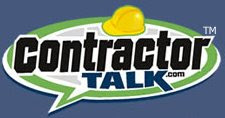 This contractortalk.com thread, Phone Number or Not, starts out with a seemingly simple question:
This contractortalk.com thread, Phone Number or Not, starts out with a seemingly simple question:
Hi, will be getting some polo t-shirts printed with my name on them, but the sales guy reckons I should not put the phone number on them, he says they look more professional without it.I would still like to put it on. Will have shirts for working day to day and some others for going to price jobs.
All comments appreciated on phone number or not.
Familiar is referring to branding. Seeing your company name on a shirt is branding.
The phone number is about information used to contact you. The two are completely unrelated.
I like this response. And here is another one, a little off topic, but insightful nonetheless, from Concretemasonry in Minnesota:Number on a truck makes sense because it's pretty hard for somebody to catch up to you, flag you down and have you give them your number.
Number on a shirt? If somebody is close enough to see your logo on your shirt they are close enough to start a conversation.
Possibility and probability are completely different but sometimes we forget that. There is a possibility of winning the lottery, the probability is astronomically low. There is a possibility of somebody calling you solely based on you phone number on a shirt, the probability is astronomically low.
Marketing is not about directing your efforts at the exceptions, not at the one in a million returns. If somebody wants to put their phone number on their company shirt, go for it. You're not harming anyone, but you certainly are wasting your time if you think you are doing it to bring in business.
Company shirts' #1 purpose is to display a professional, unified (as in uniform) appearance. Secondary is to market your company by coincidence being in a potential prospects face who is in the market for services your company provides, however as mentioned if they are close enough to read your shirt they are close enough to start a conversation. Believing that prospect is going to whip out a note pad and shyly write down your phone number and spirit it home till he gets up the courage to call you is like believing the lottery is a valid retirement program.
But like I said you aren't hurting anybody by putting your phone number on your shirt. You aren't doing anything productive either. The pros and cons are like splitting hairs.
Give aways make the person receiving happy, but does not really sell anything.
I had ordered 1,500 traditional caps and my boss asked what they would look like. He said cancel the order and take off the company name and logo, make them white and add "Good Guy" to them instead. Follows the old saying "the Good Guys Always Wear White Hats". I did as suggested and it was the best thing we could do. Everyone in the local industry wanted them and people buying elsewhere were looking for our salesmen. We had to re-order several times.
Only the important people (contractor/buyer customers) knew where they came from. We even got requests from architects and other groups organizing golf or fishing events. There are also ways to handle the guys who are a year late in copying.
This concept does not apply if you are trying to create a company image, unless you require your employees to wear a clean one every day.
The best give-away advertising does not need a name of it if the person getting it remembers where it came from.
I think the most useful lesson here is that you will find real advantages in making use of company apparel and clothing give-aways. The advantage of an informal, but comfortable, "company uniform" (but not one so uniform that individuality is stifled and employees feel like they are corporate cogs) cannot be understated, when it comes to building and managing your business image and brand. The distinctions and subtleties of what you actually say on these clothing items is of course the topic of this thread, and here I agree with Finlay that, for clothing items, the number really isn't essential but it is a detail -- and concretemasonry suggests how, by making the clothing item generic, you can achieve a form of viral marketing within your community (yes, people who see the cap here don't know where it comes from, but the people who count indeed know.)









No comments:
Post a Comment